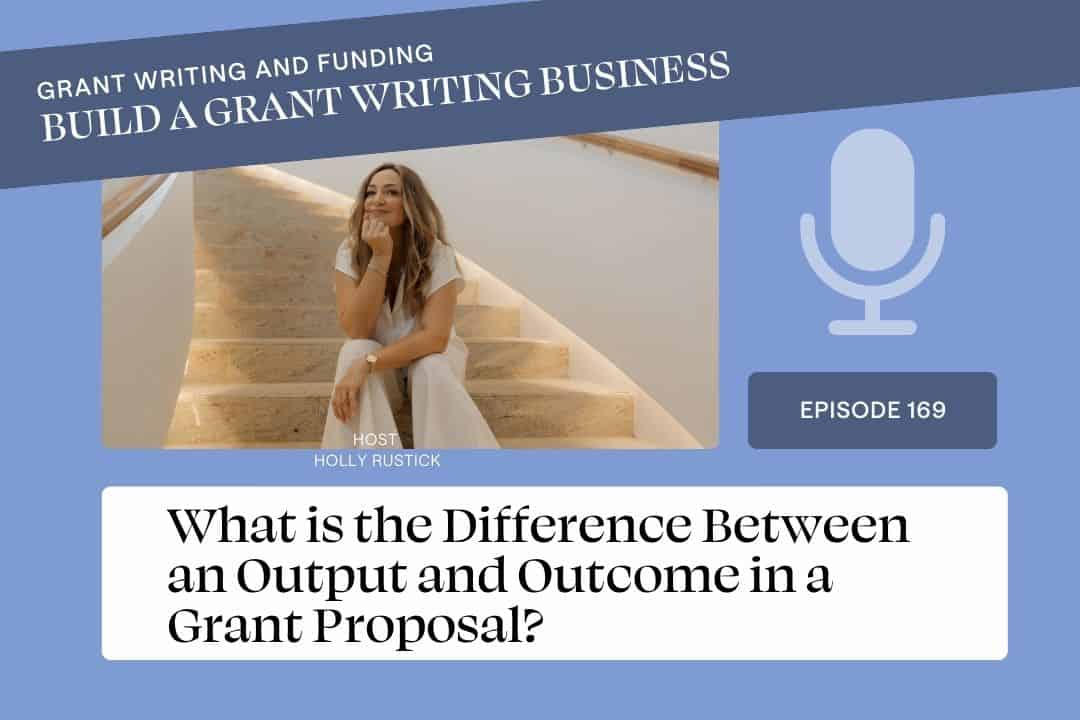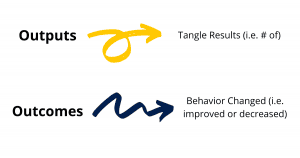What is the Difference Between an Output and Outcome in a Grant Proposal?

May 5, 2021
The difference between an output and outcome in a grant proposal might not seem quite different at first. In fact, it might feel downright like the same darn thing.
For many grant writers the difference between an output and outcome can feel a little abstract and confusing.
While rubbing your temples with fingers full of stress-induced Dorito dust, you might be thinking, “What is the difference?!”
Are grant funding sources just trying to trick you with these output and outcome words?
Are they chuckling in the background while you keep saying “to-may-to / to-mah-to” on repeat.
Nah, grant reviewers aren’t that bored (although many do have a good sense of humor).
But you do need to know what the difference is between outputs and outcomes, and better yet, understand the difference.
Once you understand what the differences (and similarities) are between grant outputs and outcomes it will make your grant writing SO much better.
Okay, so let’s get down to it.
Defining Outputs and Outcomes in Grant Proposals
I’ve seen many definitions and I will use the definition from Alta Alonzi and then give you even a shorter version answer.
From Proposals for NGOs:
Outputs
- Directly produced by the project; as long as you completed the project activities, you will create an output
- Typically tangible and easy to measure
- Not the reason why the project was necessary
Outcomes
- Produced from the project outputs; just completing the project activities does not guarantee that the outcomes were also achieved
- Typically more intangible and harder to measure
- The reason why the project is necessary
Here are my succinct definitions:
- Output: The quantitative and tangible result of the project and can easily be measured.
- Outcome: The qualitative and behavioral result of the project.

Examples of Grant Outputs & Outcomes in a Grant Proposal
Let’s go ahead and look at some examples of outputs and outcomes as this is where you might have the ‘Aha!’ factor…
Outputs and outcomes are items, or elements, that will result from achieving objectives.
Not to confuse you with another ‘O’ word, but remember an objective is SMART and needs to be achieved in order to fulfill the goal of the project.
Let’s reflect on our objective from episode #167: How to Write Objectives for Grant Proposals.
Objective Sample (also taken from the Amazon Bestselling Book, “The Beginner’s Guide to Grant Writing”):
100 disadvantaged youth in Rocking Socks will receive sports scholarships by the end of twelve months.

Now what did I mean about being able to measure the outputs? Well, it can be quite simple.
Measuring Outputs and Outcomes in Grant Proposals
Will 100 scholarships be awarded?
That is something you can easily and tangibly measure. That’s either a yes or no. You can also measure how many scholarships are awarded. This is an output.
Now let’s look at the outcome, improving confidence and test scores. This might not be an immediate behavior change to be able to measure. This will take a bit more time to reflect on and need a good evaluation strategy.
Yes, the outcome can be measured but it’s not as tangible and also includes a shift in attitude and behavior. This is where real change happens, as well.
The outcome is what you are really wanting. The output is what you think will help get you there.
100 soccer scholarships might not result in this outcome change, but it’s what the grant project thinks will help improve confidence and test scores. If they don't have these soccer scholarships, then they might not be able to play soccer.
Here’s the thing. If you don’t think your output will result in achieving your outcome, you might want to change the output.
Summary of Grant Outputs and Outcomes in a Grant Proposal
I hope you can see here that outputs and outcomes are not exact opposites. It’s not really an output versus an outcome, but it’s more a trajectory and relationship. You will see them side by side in logic models and this causal relationship is why.
The output will hopefully result in the outcome.
Now you know why there are both outputs and outcomes in a grant proposal and how they complement one another. Remember it’s not just a ‘to-may-to / to-mah-to’ differentiation. These really are two different concepts that work together.
It’s too bad they didn’t start with different letters to not confuse grant writers, but alas, that is what we got!
Links and Resources:
- Episode #167: How to Write an Objective for a Grant Proposal: Click here.
- Proposal for NGOs: What's the Difference? Project Outputs vs. Outcomes. Click here.
- Episode #6: Write Goals, Objectives, and Outcomes for Your Grant Proposal. Click here.
- Episode #143: 5 Most Popular Grant Writing Questions. Click here.
- Episode #141: Grant Writing Made Easy: 5 Hacks to Write a Grant Proposal. Click here.
Holly Rustick
Meet the author Holly Rustick
Work with Me
Write Grants, Get Paid.
Freelance Grant Writer Academy
Grant Professional Mentorship
JOIN OUR NEWSLETTER
Holly Rustick is a world-renowned grant writing expert and Amazon bestselling author.
Holly has been coaching grant writers how to run successful 5-6 figure businesses since 2017.
With two decades of grant writing and nonprofit experience, Holly is a popular keynote speaker for events all over the world, podcast host of the Top-Ranked Grant Writing podcast, a former university instructor, and is past president of the Guam Women’s Chamber of Commerce. She is constantly booked out to run trainings to help grant writers grow capacity, increase funding, and advance mission.
Love this post? You'll love these resources.
GET ACCESS NOW
Free Grant Writing Class
Get the proven 7 steps to eliminate anxiety and get Holly’s 20 years of secrets to start writing winning grants.
You will get the grant writing system that has helped Holly secure more than $25 million in grant funding and students earn more than $100,000,000 in funding for nonprofits around the world!
GET ACCESS NOW
Free 5-Step Checklist
OUR SPICY BELIEF IS THAT ALL GRANT WRITERS SHOULD START A BUSINESS, EVEN IF IT’S PART-TIME.
Work from home and have a massive impact on your community. Set up a grant writing business so you can start getting paid to write grants.